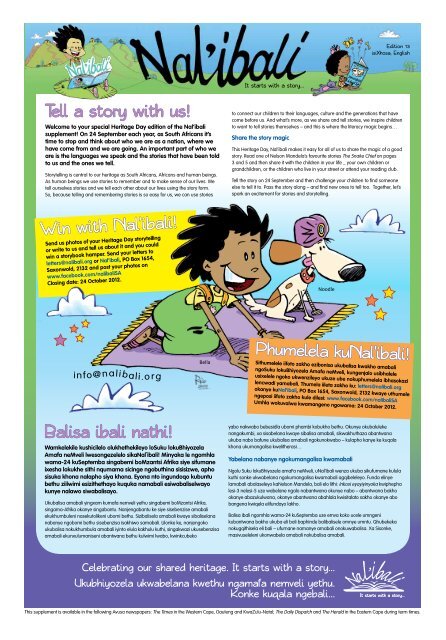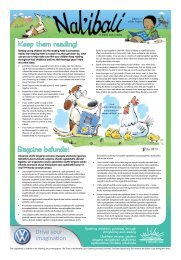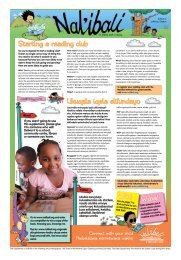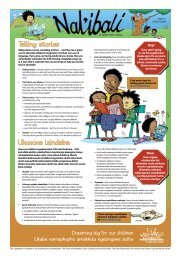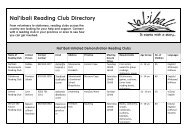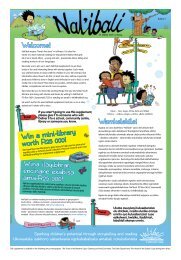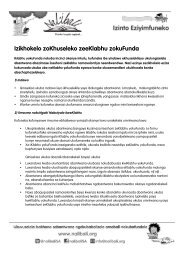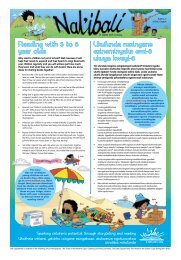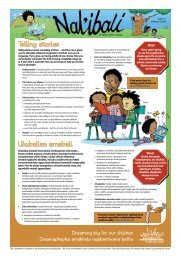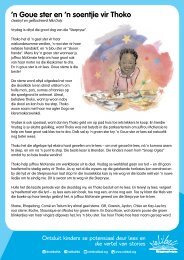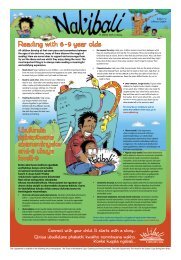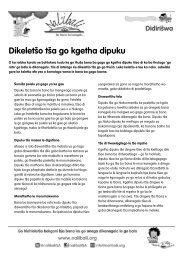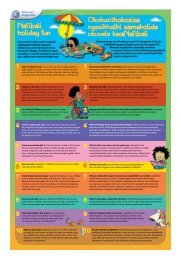Balisa ibali nathi! Tell a story with us! Win with Nal'ibali! Phumelela ...
Balisa ibali nathi! Tell a story with us! Win with Nal'ibali! Phumelela ...
Balisa ibali nathi! Tell a story with us! Win with Nal'ibali! Phumelela ...
You also want an ePaper? Increase the reach of your titles
YUMPU automatically turns print PDFs into web optimized ePapers that Google loves.
Edition 13<br />
isiXhosa, English<br />
<strong>Tell</strong> a <strong>story</strong> <strong>with</strong> <strong>us</strong>!<br />
Welcome to your special Heritage Day edition of the Nal’<strong>ibali</strong><br />
supplement! On 24 September each year, as South Africans it’s<br />
time to stop and think about who we are as a nation, where we<br />
have come from and we are going. An important part of who we<br />
are is the languages we speak and the stories that have been told<br />
to <strong>us</strong> and the ones we tell.<br />
Storytelling is central to our heritage as South Africans, Africans and human beings.<br />
As human beings we <strong>us</strong>e stories to remember and to make sense of our lives. We<br />
tell ourselves stories and we tell each other about our lives <strong>us</strong>ing the <strong>story</strong> form.<br />
So, beca<strong>us</strong>e telling and remembering stories is so easy for <strong>us</strong>, we can <strong>us</strong>e stories<br />
to connect our children to their languages, culture and the generations that have<br />
come before <strong>us</strong>. And what’s more, as we share and tell stories, we inspire children<br />
to want to tell stories themselves – and this is where the literacy magic begins…<br />
Share the <strong>story</strong> magic<br />
This Heritage Day, Nal’<strong>ibali</strong> makes it easy for all of <strong>us</strong> to share the magic of a good<br />
<strong>story</strong>. Read one of Nelson Mandela’s favourite stories The Snake Chief on pages<br />
3 and 5 and then share it <strong>with</strong> the children in your life _ your own children or<br />
grandchildren, or the children who live in your street or attend your reading club.<br />
<strong>Tell</strong> the <strong>story</strong> on 24 September and then challenge your children to find someone<br />
else to tell it to. Pass the <strong>story</strong> along – and find new ones to tell too. Together, let’s<br />
spark an excitement for stories and <strong>story</strong>telling.<br />
<strong>Win</strong> <strong>with</strong> Nal'<strong>ibali</strong>!<br />
Send <strong>us</strong> photos of your Heritage Day <strong>story</strong>telling<br />
or write to <strong>us</strong> and tell <strong>us</strong> about it and you could<br />
win a <strong>story</strong>book hamper. Send your letters to<br />
letters@nal<strong>ibali</strong>.org or Nal’<strong>ibali</strong>, PO Box 1654,<br />
Saxonwold, 2132 and post your photos on<br />
www.facebook.com/nal<strong>ibali</strong>SA<br />
Closing date: 24 October 2012.<br />
Noodle<br />
info@nal<strong>ibali</strong>.org<br />
Bella<br />
<strong>Phumelela</strong> kuNal'<strong>ibali</strong>!<br />
Sithumelele iifoto zakho ezibonisa ukubalisa kwakho amabali<br />
ngoSuku lokuBhiyozela Amafa neMveli, kungenjalo <strong>us</strong>ibhalele<br />
<strong>us</strong>ixelele ngoko ukwenzileyo ukuze ube nokuphumelela ibhasokazi<br />
lencwadi yamabali. Thumela iileta zakho ku: letters@nal<strong>ibali</strong>.org<br />
okanye kuNal’<strong>ibali</strong>, PO Box 1654, Saxonwold, 2132 kwaye uthumele<br />
ngeposi iifoto zakho kule dilesi: www.facebook.com/nal<strong>ibali</strong>SA<br />
Umhla wokuvalwa kwamangeno ngowama: 24 October 2012.<br />
<strong>Balisa</strong> <strong>ibali</strong> <strong>nathi</strong>!<br />
Wamkelekile k<strong>us</strong>hicilelo olukhethekileyo loSuku lokuBhiyozela<br />
Amafa neMveli lwesongezelelo sikaNal`<strong>ibali</strong>! Minyaka le ngomhla<br />
wama-24 kuSeptemba singabemi boMzantsi Afrika siye sifumane<br />
ixesha lokukhe sithi nqumama sicinge ngobuthina sisisizwe, apho<br />
sisuka khona nalapho siya khona. Eyona nto ingundoqo kubuntu<br />
bethu ziilwimi esizithethayo kuquka namabali esiwabaliselwayo<br />
kunye nalawo siwabalisayo.<br />
Ukubalisa amabali yingxam kumafa nemveli yethu singabemi boMzantsi Afrika,<br />
singama-Afrika okanye singabantu. Nanjengabantu ke siye sisebenzise amabali<br />
ekukhumbuleni nasekutolikeni ubomi bethu. Siz<strong>ibali</strong>sela amabali kwaye s<strong>ibali</strong>selana<br />
nabanye ngobomi bethu sisebenzisa isakhiwo samabali. Lilonke ke, nanjengoko<br />
ukubalisa nokukhumbula amabali iyinto elula kakhulu kuthi, singakwazi uk<strong>us</strong>ebenzisa<br />
amabali ekunxulumaniseni abantwana bethu kulwimi lwabo, kwinkcubeko<br />
yabo nakwabo bebesidla ubomi phambi kobukho bethu. Okunye okubaluleke<br />
nangakumbi, xa sisabelana kwaye s<strong>ibali</strong>sa amabali, sikwakhuthaza abantwana<br />
ukuba nabo bafune ukubalisa amabali ngokunokwabo – kulapho kanye ke kuqala<br />
khona ukumangalisa kwelitherasi…<br />
Yabelana nabanye ngokumangalisa kwamabali<br />
Ngolu Suku lokuBhiyozela amaFa neMveli, uNal’<strong>ibali</strong> wenza ukuba sikufumane kulula<br />
kuthi sonke ukwabelana ngokumangalisa kwamabali agqibeleleyo. Funda elinye<br />
lamabali abalaseleyo kaNelson Mandela, bali elo lithi: Inkosi eyayiyinyoka kwiphepha<br />
lesi-3 nelesi-5 uze wabelane ngalo nabantwana okunye nabo – abantwana bakho<br />
okanye abazukulwana, okanye abantwana abahlala kwisitalato sakho okanye abo<br />
bangena kwiqela elifundayo lakho.<br />
<strong>Balisa</strong> <strong>ibali</strong> ngomhla wama-24 kuSeptemba uze emva koko ucele umngeni<br />
kubantwana bakho ukuba eli bali baphinde bal<strong>ibali</strong>sele omnye umntu. Qhubekeka<br />
nokugqithisela eli bali – ufumane namanye amabali onokuwabalisa. Xa Sisonke,<br />
masiv<strong>us</strong>eleleni ukonwabela amabali nokubalisa amabali.<br />
Celebrating our shared heritage. It starts <strong>with</strong> a <strong>story</strong>...<br />
Ukubhiyozela ukwabelana kwethu ngamafa nemveli yethu.<br />
Konke kuqala ngebali...<br />
This supplement is available in the following Av<strong>us</strong>a newspapers: The Times in the Western Cape, Gauteng and KwaZulu-Natal; The Daily Dispatch and The Herald in the Eastern Cape during term times.
Get <strong>story</strong> active!<br />
The Snake Chief is a <strong>story</strong> that has been told in different ways<br />
over time in South Africa and also in other parts of Africa. It<br />
has all the elements of an exciting <strong>story</strong>: a mother’s love, a<br />
daughter’s steadfastness and an evil snake!<br />
Read the <strong>story</strong>, on pages 3 and 5 of this supplement a few times and then retell<br />
it in your own way to your children. Encourage them to participate by asking<br />
questions like, ‘And do you know what happened next?’ and ‘So what do you<br />
think Nandi did?’<br />
Once you know the <strong>story</strong> well and have told it a few times, add new and<br />
interesting details of your own! This will encourage your listeners to continue<br />
<strong>us</strong>ing their imaginations and will deepen their understanding of the <strong>story</strong>.<br />
Here are some activity ideas for you to try out.<br />
If you have 10 minutes…<br />
<br />
With your children, talk about how all people make errors in judgement<br />
and share examples of when you have done this. Ask them to think of<br />
times when they made mistakes like this. Together disc<strong>us</strong>s how Nandi<br />
made a mistake in the <strong>story</strong>.<br />
If you have 30 minutes…<br />
<br />
<br />
Encourage your children to draw a picture of a scene from the <strong>story</strong>. Help<br />
younger children write about the scene by writing the words they tell you.<br />
Let older children try writing a paragraph about their picture on their own.<br />
If you’re at a reading club, display the pictures and writing and encourage<br />
the children to read each other’s writing.<br />
Retell the <strong>story</strong> in a <strong>story</strong> circle. You can start the <strong>story</strong> and then ask the<br />
person on your right to continue it. Give everyone in the circle a chance to<br />
tell part of the <strong>story</strong>.<br />
If you have one hour…<br />
<br />
<br />
With your children, <strong>us</strong>e thin cardboard (like the kind you find on a cereal<br />
box), crayons and scissors to draw and cut out pictures of Nandi, her<br />
daughter, the snake and the chief’s son. Paste them on the top of thin<br />
sticks and then <strong>us</strong>e them as puppets to retell the <strong>story</strong>.<br />
Follow the instructions at the bottom of the page to make <strong>story</strong> cards.<br />
Older children can <strong>us</strong>e the cards to read the <strong>story</strong> on their own and to<br />
younger children.<br />
Yenza <strong>ibali</strong> linike umdla!<br />
Inkosi eyayiyinyoka l<strong>ibali</strong> esele l<strong>ibali</strong>swe ngeendlela ezahlukileyo<br />
apha ekuhambeni kwexesha eMzantsi Afrika nakumanye<br />
amazwe e-Afrika. Konke okuqulathwe l<strong>ibali</strong> eligqwesileyo<br />
kuyafumaneka kweli bali: uthando lukamama, ukungagungqi<br />
kwentombazana kunye nenyoka ehendayo!<br />
Funda <strong>ibali</strong> elikwiphepha lesi-3 nelesi-5 lesi songezelelo izihlandlo eziliqela uze<br />
ul<strong>ibali</strong>sele abantwana bakho ngendlela yakho. Bakhuthaze ukuba bathathe<br />
inxaxheba ngokuthi babuze imibuzo efana nale: ‘Ingaba uyazi ukuba kwenzeke<br />
ntoni emva koku?’ kunye nalo: ‘Ucinga ukuba uNandi wenza ntoni?’<br />
Xa <strong>ibali</strong> ulazi ngokupheleleyo kwaye sele ul<strong>ibali</strong>se kaninzi, yangeza iinkcukacha<br />
zakho ezintsha nezinika umdla! Oku kuza kukhuthaza abo bakumameleyo ukuba<br />
basebenzise ingqiqo yabo kwaye baya kutsho balazi ngokugqibeleleyo <strong>ibali</strong>. Nazi<br />
ezinye zeengcebiso zemisebenzi onokukhe uzizame.<br />
Ukuba unemizuzu eli-10…<br />
Wena nabantwana bakho ncokolani ngendlela abantu abenza ngayo<br />
iimpazamo kwindlela abathatha ngayo izigqibo nize emva koko nabelane<br />
ngemizekelo yoku. Bacele bazame ukucinga ngamaxesha apho nabo bathi<br />
benza iimpazamo ezikumila kunje. Xoxani kunye ngendlela athe uNandi wenza<br />
imposiso ngayo ebalini.<br />
Ukuba unemizuzu engama-30…<br />
Khuthaza abantwana bakho ukuba bazobe umfanekiso womboniso olapha<br />
ebalini. Ncedisa aba bantwana bancinci ekubhaleni ngomboniso lowo ngokuthi<br />
ubhale amagama abakunika wona. Aba badala abantwana banike ithuba<br />
lokubhala umhlathi ngokunokwabo malunga nemifanekiso abayizobileyo.<br />
Ukuba ukwiqela elifundayo, bonisa ngale mifanekiso noko kubhaliweyo uze<br />
ukhuthaze abantwana ukuba bafunde oko kubhalwe ngabanye.<br />
<strong>Balisa</strong>ni kwakhona eli bali kwindawo yebali. Ungaliqala ngokwakho <strong>ibali</strong> uze<br />
ucele lowo uhleli ngasekunene kwakho ukuba aqhubekeke nebali. Nika umntu<br />
ngamnye kwisangqa ithuba lokubalisa indawo ethile yebali.<br />
Ukuba uneyure enye…<br />
Wena nabantwana bakho, sebenzisani ikhadibhodi (efana nqwa nale<br />
yebhokisi yesiriyeli), iikhrayoni nezikere ukuze nizobe nize nisike imifanekiso<br />
kaNandi, intombi yakhe, inyoka kunye nonyana wenkosi. Yincamathisele phezu<br />
kweentongana ezibhityileyo uze uyisebenzise njengoonopopi bokubalisa<br />
kwakhona <strong>ibali</strong>.<br />
<br />
Landela le miyalelo ingezantsi ekwenzeni amakhadi ebali. Abantwana<br />
abadalana bangawasebenzisa ekuzifundeleni <strong>ibali</strong> nasekufundeleni<br />
abantwana abancinci.<br />
This Heritage Day, we remember somebody who cared very much about the wellbeing of all of the people who live in<br />
South Africa – Neville Alexander. Neville, who sadly died on the 27 Aug<strong>us</strong>t 2012, put enormo<strong>us</strong> energy behind igniting<br />
the reading club fire beca<strong>us</strong>e he understood the power of ideas, which we share through our words and our stories.<br />
He told many stories himself about the ten years he spent on Robben Island <strong>with</strong> Nelson Mandela, Walter Sisulu and<br />
other political prisoners. He told of the hardships prisoners had to suffer like only ever washing in cold salty sea water<br />
and only once ever hearing the sound of children’s voices! But even though life was really tough, these men<br />
were so convinced that all South Africans should be free to lived dignified lives <strong>with</strong> equal opportunities, that<br />
they turned the prison on the island into a university where they read all kinds of things like hi<strong>story</strong> and<br />
politics and even lots of stories to one another. Their readings and disc<strong>us</strong>sions gave them hope and helped<br />
them prepare for the new South Africa that they were dreaming about.<br />
Ngolu Suku lokuBhiyozela Amafa neMveli, sikhumbula umntu obe nenkathalo engathethekiyo<br />
ngokuphathelele kubomi obungcono babo bonke abantu abahlala eMzantsi Afrika – uNeville<br />
Alexander. UNeville, nothe wasandulela ngomhla wama-27 ku-Agasti ka-2012, unikezele<br />
ngamandla akhe onke ekuphembeleleni ukumiliselwa kwamaqela afundayo kuba ebewazi<br />
kakuhle amandla ezimvo, zimvo ezo sabelana ngazo ngamagama esiwathethayo nangamabali.<br />
Maninzi kakhulu amabali naye athe wawabalisa malunga neminyaka elishumi ayichithe eRobben<br />
Island kunye noNelson Mandela, uWalter Sisulu kunye nezinye iinkokheli zopolitiko ezazivalelwe<br />
entolongweni. Ukhe wabalisa ngeenzima amabanjwa ayejongene nazo kuquka nokuhlamba<br />
kuphela ngamanzi abandayo olwandle anetyuwa, kwanokuba wakhe waweva kwakanye amazwi<br />
abantwana kwelo xesha wayelichithe apho esiqithini! Kodwa ke nangona ubomi babunzima,<br />
onke la madoda ayezinikele kwiingcamango yokuba bonke abemi boMzantsi Afrika kufuneka<br />
bakhululeke ukuze baphile ubomi obundilisekileyo, benamathuba alinganayo, kangangokuba<br />
bakwazi ukuyijika intolongo yayiyunivesithi apho babefundelana khona yonke into, njengeembali<br />
nezopolitiko nkqu namabali amaninzi. Oku kufunda kwabo kwakuhamba neengxoxo, kwabanika<br />
ithemba kwaze kwabanceda ukuze bazilungiselele uMzantsi Afrika omtsha owawuliphupha labo.<br />
Create your own <strong>story</strong> cards<br />
1. When you have finished<br />
reading the supplement, take<br />
out pages 3 to 6.<br />
2. Cut along the dotted lines on<br />
each page.<br />
3. Paste each part of the <strong>story</strong><br />
on either side of an A4 sheet<br />
of cardboard. Use a separate<br />
sheet of cardboard for each<br />
language.<br />
4. If possible, cover the cards<br />
<strong>with</strong> plastic.<br />
Zenzele awakho amakhadi ebali<br />
1. Xa ugqibile ukufunda isongezelelo,<br />
khupha amaphepha uk<strong>us</strong>uka kwelesi-3<br />
ukuya kwelesi-6.<br />
2. Sika phezu kwemigca engamachaphaza<br />
kwiphepha ngalinye.<br />
3. Ncamathelisa inxenye nganye<br />
yebali kwicala ngalinye lekhadibhodi<br />
enomlinganiselo we-A4. Icala ngalinye<br />
lekhadibhodi kufuneka ulisebenzisele<br />
ulwimi ngalunye.<br />
4. Ukuba ikho indlela, amakhadi kufuneka<br />
uwaqukumbele ngeplastiki.<br />
The Snake Chief appears in Madiba Magic: Nelson<br />
Mandela’s Favourite Stories for Children, published by<br />
Tafelberg. It was translated from isiZulu into English by<br />
T. Cele and retold in English by Diana Pitcher. Ill<strong>us</strong>tration<br />
by Niki Daly.<br />
Inkosi eyayiyinyoka iyafumaneka kule ncwadi:<br />
Ikhubalo lika Madiba: Iintsomi ezithandwa kakhulu<br />
nguNelson Mandela ngesiNguni,<br />
neshicilelwe ngabakwaTafelberg.<br />
Le ntsomi is<strong>us</strong>elwa entsomini<br />
eyayitolikwe nguPamella Maseko.<br />
Imizobo nguNiki Daly.<br />
2
ENGLISH<br />
The Snake Chief<br />
NANDI WAS VERY POOR. Her h<strong>us</strong>band was dead<br />
and she had no sons to herd cattle and only one<br />
<br />
In summer, when the umdoni trees were full of<br />
<br />
dumbe to eat <strong>with</strong> their maize porridge. But in<br />
<br />
umdoni berries, purple and sweet, and gave them to<br />
her neighbours in return for strips of dried goat meat<br />
or calabashes of thick and creamy sour milk.<br />
One hot day Nandi went down to the river as <strong>us</strong>ual to<br />
<br />
Not a single berry was to be seen – not one.<br />
J<strong>us</strong>t then she heard a loud hissing, a loud and terrible<br />
<br />
wound round and round the dark red trunk of the tree,<br />
his head swaying among the branches. He was eating<br />
all the berries.<br />
“You are stealing my berries,” she called. “Oh, Snake,<br />
you are stealing all my berries. What will I have to<br />
exchange for meat if you take all the fruit?”<br />
Snake hissed again and started to slither down the<br />
trunk. Nandi was afraid, but if she ran away there<br />
would be no berries for her.<br />
“What will you give me in exchange for the umdoni<br />
<br />
me your daughter?”<br />
home lest he were watching.<br />
She crossed the river where the water ran shallow over<br />
the rocks and made her way into the b<strong>us</strong>h on the other<br />
bank, silently slipping between the thorn trees. She did<br />
not know that a long thorn had scratched her leather skirt<br />
and that a tiny piece of leather was left caught on a tree.<br />
She made her way carefully and silently through the<br />
<br />
through the deep pool. She did not know that a plump,<br />
<br />
behind her in the water.<br />
<br />
that, she could not possibly be seen from the umdoni<br />
trees. But she caught her foot in the entrance to<br />
Waterrat’s secret tunnel. She did not know that she left<br />
three beads from her anklet lying in the soft brown earth.<br />
At last she reached her hut and cried out to her daughter,<br />
“My child, I have done an evil deed. I have promised<br />
you to Snake in return for this basket of purple fruit.”<br />
And she burst into tears.<br />
Meanwhile Snake had slithered down the tree to follow<br />
Nandi. This way and that his head swayed, until he saw<br />
the little piece of leather on the thorn and he knew which<br />
way to go.<br />
This way and that his head swayed again, until he saw a<br />
<br />
which way to go.<br />
I cannot give you my daughter.”<br />
The young girl looked up. Her dark brown eyes were<br />
gentle and quite fearless.<br />
“A promise is a promise, Mother,” she said. “You<br />
m<strong>us</strong>t surely give me to Snake.” She put out her hand<br />
<br />
<br />
full of thick and creamy sour milk for him to drink.<br />
Then she folded her blanket and made a bed for her<br />
snake master.<br />
“Yes,” cried Nandi, “I’ll give you my daughter this<br />
<br />
fruit.”<br />
But once her basket was full and Nandi was on her<br />
way home she began to tremble at what she had<br />
promised. How could she give her daughter to such<br />
an ugly creature? She m<strong>us</strong>t make sure that Snake did<br />
<br />
This way and that his head swayed once more, until he<br />
saw three beads lying at the mouth of Waterrat’s tunnel<br />
and he knew which way to go.<br />
J<strong>us</strong>t as Nandi burst into tears, there was a loud hissing at<br />
the entrance to her hut and Snake slid in, coiling his long<br />
<br />
“No! No!” cried Nandi. “I did not mean my promise.<br />
During the night Nandi stirred. What had wakened<br />
her? Had Leopard coughed? Had Hyena sung to the<br />
moon? Something had disturbed her. She listened<br />
again. Voices. She could hear voices. That was her<br />
daughter speaking. But whose was that other voice?<br />
That deep, strong voice?<br />
Silently she crept from her skin blankets. What did<br />
she see? Was she still asleep and dreaming? Sitting<br />
1 2<br />
<strong>with</strong> her daughter was a handsome young man, tall,<br />
brown and strong. Surely a chief’s son, perhaps even<br />
a chief. Her daughter was making a bead necklace,<br />
weaving a wedding pattern <strong>with</strong> the multicoloured<br />
beads. And the young man was talking gently and<br />
lovingly to her as she worked.<br />
Nandi looked at the folded blanket where Snake had<br />
<br />
<br />
burned low in the middle of the hut.<br />
“Now is the spell broken,” spoke the snake chief. “For<br />
a virtuo<strong>us</strong> girl took pity on me and a foolish old woman<br />
has burned my skin.” But in spite of his harsh words he<br />
smiled gently at Nandi.<br />
Nandi now has three grandchildren – a boy to herd the<br />
cattle on the veld and two girls to help her hoe the weeds<br />
from among the maize plants and to dig for amadumbe.<br />
She no longer needs to gather umdoni berries, for there<br />
is enough food for all.<br />
3
Story stars<br />
South Africa's star <strong>story</strong>teller<br />
Gcina Mhlophe is probably South Africa’s best known <strong>story</strong>teller.<br />
She has travelled all over the world to tell stories – and she is also<br />
an author, poet, playwright, director and performer! Since 1988,<br />
Gcina has been holding <strong>story</strong>telling workshops in libraries and<br />
schools across the country. She tells stories in English, Afrikaans,<br />
isiXhosa and isiZulu. But that is not<br />
all…Gcina has worked tirelessly<br />
for the past 11 years running the<br />
‘Nozincwadi Mother of Books<br />
Literacy Campaign’ to help make<br />
South Africa a reading nation. She<br />
is deeply committed to keeping<br />
the art of <strong>story</strong>telling alive and to<br />
inspiring children to read.<br />
Who told you stories when you were a child?<br />
My grandmother.<br />
When did you start telling stories and to<br />
whom did you tell them?<br />
First I shared them <strong>with</strong> my school friends<br />
and then to the children I took care of as a<br />
nanny for a few months. I began <strong>story</strong>telling<br />
more serio<strong>us</strong>ly when I told stories in libraries<br />
and m<strong>us</strong>eums during a trip to the USA as an<br />
actress and director.<br />
Where do you get the stories from?<br />
The stories I tell are from long ago or I hear<br />
them on my international travels. Of course,<br />
since I am a writer, I write new stories too!<br />
Do you prefer reading fiction or non-fiction?<br />
Both – all I need is a <strong>story</strong> that is welltold.<br />
My favourite place to read is...<br />
My bed and in airports when I travel.<br />
What languages do you read in?<br />
Mostly English but also isiZulu and isiXhosa, especially poetry.<br />
The greatest lesson that I learnt from a book or <strong>story</strong> was that...<br />
An author’s voice can jump up from the page and straight into my heart! Some of<br />
the authors that have done this for me are Isabelle Allende, Alice Walker, AC Jordan,<br />
Sindiwe Magona, Paulo Quello, Maya Angelo and Mariama Ba.<br />
Every child should read...<br />
Haroon and the Sea of Stories by Salman R<strong>us</strong>hdie<br />
When my daughter was younger, her favourite picture book was …<br />
So much! by Trish Cooke and Helen Oxenbury. For a while we talked about the<br />
characters in the book as if they were our family friends – especially Uncle Didi.<br />
When and where did you <strong>us</strong>ed to read to your daughter?<br />
All the time and all over the place – in the garden, in bed! She loved books and stories<br />
from the start.<br />
What language/s did you read to her in?<br />
IsiZulu and English – it was such fun! Her father read to her in German.<br />
Iimbalasane zamabali<br />
Imbalasane yamabali<br />
yaseMzantsi Afrika<br />
UGcina Mhlophe inokuba ngoyena mbalisi mabali waziwa kakhulu<br />
eMzantsi Afrika. Uhambe lonke ilizwe esiya kubalisa amabali –<br />
phofu ke ukwangumbhali, imbongi, umbhali wemidlalo yeqonga,<br />
umlawuli kwanomdlali weqonga! Uk<strong>us</strong><strong>us</strong>ela<br />
ku-1988, uGcina umana uk<strong>us</strong>ingatha imisebenzi<br />
yocweyo lwamabali kumathala eencwadi<br />
nasezikolweni kwilizwe loMzantsi Afrika uphela.<br />
Ubalisa amabali ngesiNgesi, isiAfrikansi, isiXhosa<br />
nangesiZulu. Kodwa ke akuphelelanga apho…<br />
uGcina <strong>us</strong>ebenze engadinwa kule minyaka ili-11<br />
idlulileyo eququzelela iphulo elibizwa ngokuba<br />
ngu‘Nozincwadi Mother of Books Literacy<br />
Campaign’ ngeenjongo zokunceda uMzantsi<br />
Afrika ekubeni ube lilizwe elifundayo. Uzinikezele<br />
kakhulu ekugcineni ubugcisa bokubalisa<br />
amabali buphila ndawonye nasekukhuthazeni<br />
abantwana ukuba bafunde.<br />
Gcina Mhlophe<br />
Wawuwabaliselwa ngubani amabali <strong>us</strong>engumntwana?<br />
Ngumakhulu wam.<br />
Waqala nini ukubalisa amabali, kwaye loo mabali<br />
wawuwabalisela bani?<br />
Ndaqala ngokuwabalisela abahlobo bam basesikolweni,<br />
emva koko ndabalisela abantwana endandibagcina<br />
kwiinyanga nje ezimbalwa. Ndiqale ukubalisa amabali<br />
ngokuzimisela mhla ndandiwabalisa kumathala eencwadi<br />
nakwiimyuziyamu kuhambo lwam lwase-USA, apho ndandiye<br />
khona njengomdlali weqonga kwanomlawuli wemidlalo<br />
yeqonga.<br />
Uwafumana phi amabali?<br />
Amabali endiwabalisayo ngawakudala okanye ke<br />
ndiwafumana kuhambo lwam lwamazwe ngamazwe. Nawe uyazi ke, njengombhali,<br />
ndiyawabhala namabali amatsha.<br />
Ukhetha ukufunda amabali aziintsomi okanye anobunyani?<br />
Omabini – eyona nto ndiyifunayo l<strong>ibali</strong> el<strong>ibali</strong>swe kakuhle.<br />
Eyona ndawo ndithanda ukufundela kuyo....<br />
Yibhedi yam nakwizikhululo zeenqwelomoya xa ndiseluhambeni.<br />
Ufunda ngeziphi iilwimi?<br />
Ndifunda kakhulu ngesiNgesi, kodwa nangesiZulu nangesiXhosa, ingakumbi isihobe.<br />
Esona sifundo sibalulekileyo ndasifundayo encwadini okanye ebalini sesokuba...<br />
Ilizwi lombhali linakho ukuntinga lisuka ephepheni lize ngqo entliziyweni yam! Abanye<br />
bababhali abathe bandichaphazela ngolu hlobo ngabo bafana no-Isabelle Allende, Alice<br />
Walker, AC Jordan, Sindiwe Magona, Paulo Coehlo, Maya Angelo noMariama Ba.<br />
Wonke umntwana umele afunde...<br />
UHaroon and the Sea of Stories ngokubhalwe nguSalman R<strong>us</strong>hdie<br />
Ngokuya intombi yam yayisencinci, eyona ncwadi inemifanekiso wayeyithanda<br />
ngu…<br />
So much! nebhalwe nguTrish Cooke no-Helen Oxenbury. Ixesha elide sasincokola<br />
ngabalinganiswa abakuloo ncwadi ngokungathi bangabahlobo bosapho lwethu –<br />
ingakumbi uMalume uDidi.<br />
Wawuthanda ukuyifundela nini okanye phi intombi yakho?<br />
Naxesha liphi kwaye nakuyiphi na indawo – esitiyeni, ebhedini! Iincwadi wayezithanda<br />
uk<strong>us</strong>uka ekuqaleni ukuya ekupheleni.<br />
Wawumfundela ngaluphi ulwimi okanye ngeziphi iilwimi?<br />
NgesiZulu nesiNgesi – kwakumnandi kakhulu! Utata wakhe wayemfundela ngesiJamani.<br />
To read more about Gcina Mhlophe or to nominate<br />
another <strong>story</strong>teller as a Story Star, go to the Story Stars<br />
section on www.nal<strong>ibali</strong>.org<br />
Are you a skilled <strong>story</strong>teller? Visit the Support Us section<br />
on the Nal’<strong>ibali</strong> website (www.nal<strong>ibali</strong>.org) to find our<br />
directory of reading clubs that are always looking for<br />
<strong>story</strong>tellers to entertain their children.<br />
Ukuze ufunde banzi ngoGcina Mhlophe okanye uchonge omnye<br />
umbalisi mabali njengeMbalasane yamabali, yiya kwicandelo<br />
leeMbalasane zamaBali kule dilesi: www.nal<strong>ibali</strong>.org<br />
Ingaba ungumbalisi mabali onesakhono esihle? Ndwendwela<br />
kwicandelo leSupport Us kumnathazwe okanyw iwebh<strong>us</strong>ayithi<br />
kaNal’<strong>ibali</strong> kule dilesi: (www.nal<strong>ibali</strong>.org) ukuze ufumane<br />
isikhokelo samaqela afundayo ethu, maqela lawo asoloko<br />
ekhangela ababalisi mabali okonwabisa abantwana.<br />
4
ISIXHOSA<br />
Inkosi eyayiyinyoka<br />
UNANDI WAYEHLUPHEKA KAKHULU. Umyeni<br />
wakhe wayesele ekobandayo, kananjalo wayengenaye<br />
nonyana owayezakumal<strong>us</strong>ela iinkomo, wayenentombi<br />
enye kuphela awayehamba nayo bayokwemba amagontsi<br />
ababezakutshobela ngawo umphokoqo. Kodwa ekwindla xa<br />
sele zibunile iintyatyambo nezityalo zomile babethembela<br />
emaqunubeni abumthubi nabomvu kwaye emnandi,<br />
ababewakha ze batshintshise ngawo ukuze bafumane<br />
umqwayito okanye inyama eyomisiwe yebhokhwe okanye<br />
iselwa lamasi atyebileyo nagcwele yingqaka.<br />
Ngenye imini uNandi waya emlanjeni njengesiqhelo<br />
eyokukha amaqunube, kodwa zange awafumane.<br />
Kwakungekho nelinye nje iqunube elivuthiweyo, nditsho<br />
umnqongo nje.<br />
Uthe esamatshekile enjalo weva ingxolo, umfutho omkhulu<br />
wenyoka. Wathi xa ajonga phezulu, wabona inyoka enkulu<br />
eyayinombala oluhlaza nentloko engwevu iziwulula esiqwini<br />
somthi wamaqunube eyayizithandele kuwo, intloko yayo<br />
ilengalenga phakathi kwamasebe izityela amaqunube.<br />
Yayiwatye onke loo maqunube.<br />
“Ube amaqunube am,” watsho uNandi. “Owu, nyoka embi,<br />
ube onke amaqunube am. Ndizakutshintshisa ngantoni ngoku<br />
xa uthatha zonke iziqhamo zam?”<br />
Inyoka yenza ingxolokazi enkulu yaza yehlela phantsi.<br />
UNandi wayesoyika kodwa waziqinisa kuba wayesazi ukuba<br />
xa athe wabaleka akasayi kuwafumana amaqunube.<br />
“Yintoni ozakundinika yona xa ndikunika amaqunube?”<br />
yabuza inyoka. “Ukuba ndithe ndakugcwalisela ingobozi<br />
yakho ngeziqhamo uzakundinika intombi yakho?”<br />
“Ewe,” watsho uNandi el<strong>us</strong>izana. “Ndizakunika intombi yam<br />
ngoku kuhlwa kwanamhlanje. Nceda nje qha undivumele<br />
ndigcwalise ingobozi yam ngeziqhamo ezingamaqunube<br />
amnyama.”<br />
Kodwa kwathi asakuba eyigcwalisile ingobozi uNandi,<br />
sele egoduka, wangenwa luloyiko ngenxa yesithembiso<br />
asenzileyo. Kwakutheni ukuze avume ukunikezela ngentombi<br />
yakhe kwisilo esibi ngoluya hlobo? Waqonda ukuba kufuneka<br />
aqinisekise ukuba inyoka ayizukumazi apho wayehlala khona.<br />
Kwakufuneka ukuba angagoduki ngqo ukuya ekhaya, hleze<br />
kuthi kanti imjongile, kwaye iyamlandela.<br />
Wahamba ke waya kuwela umlambo ezibukweni, apho<br />
amanzi esezantsi khona. Wawela waze wathi tshwa kwihlathi<br />
elalingaphesheya komlambo. Wahamba ethubeleza phakathi<br />
kwemithi enameva. Kodwa ke akabonanga ukuba ameva lawo<br />
akrazula ilokhwe yakhe kwasala umcu wayo kwelo hlahla<br />
lomthi.<br />
Wahamba ngobunono, echwechwa kuba efuna ukungenzi<br />
ngxolo phakathi kweengcongolo, elumkele ukubonwa<br />
ziingwenya, waya kungena edamini elikhulu nelinzulu. Naxa<br />
kunjalo akabonanga ukuba esinye isihlahla samaqunube siwile<br />
engobozini saza sasala sidada apho edamini.<br />
Wahamba waya kuqabela endulini eyayilapho. Wayesazi ukuba<br />
xa athe wasithela apho, akanakuze abonwe ngumntu osemthini<br />
wamaqunube ezantsi. Kodwa wakhubeka ngonyawo lwakhe<br />
olwalumanzi esidulini seentubi. Kananjalo wathi xa angena<br />
ehlathini amahlahla aqhawula amaso akhe aselunyaweni,<br />
emaqatheni.<br />
<br />
yakhe. “Mntwana wam, ndenze into embi kakhulu. Ndithembise<br />
inyoka ukuba ndizakuyinika wena xa ithe yandigcwalisela<br />
ingobozi yam ngeziqhamo zamaqunube,” wakhala kakhulu.<br />
Kuthe kanti phaya emva inyoka yehlile emthini yalanda<br />
ekhondweni likaNandi. Yahamba ke yabona umcu welokhwe<br />
yakhe. Yaze yazi ke ngolo hlobo ukuba ebehamba apho.<br />
Ithe isahambe umganyana yabona isihlahla samaqunube sidada<br />
edamini yabe sele isazi ukuba uye kweliphi na icala. Ithe<br />
isahambe umganyana omncinane, yabona umzila wonyawo<br />
lwakhe ngakwisiduli seentumbi awayekhubeke k<strong>us</strong>o, yabe sele<br />
ilandela umkhondo lowo. Ithe isahamba njalo yabe seyibona<br />
amaso akhe, yabe ke seyilandela umkhondo lowo njalo yade<br />
<br />
<br />
asenzileyo. Kuvakele ingxolokazi enkulu yomfutho wenyoka<br />
emnyango. Yafutha yade yangena ngaphakathi, yaza yasonga<br />
umzimba wayo phezu kweziko elalilapho.<br />
“Hayi, Hayi!” wakhala uNandi. “Bendiphosisa mna<br />
ngesasithembiso sam. Andinakuze ndikwazi ukukunika<br />
intombi yam.”<br />
Intombazana encinane yaphakamisa amehlo ayo. Amehlo ayo<br />
ayenobubele kwaye ingabonakalisi loyiko.<br />
“Isithembiso sisithembiso mama,” watsho umntwana.<br />
“Kufanele ukuba undinikezele enyokeni.” Yatsho njalo<br />
<br />
yayo eluhlaza nangwevu. “Yiza,” yatsho intombazana,<br />
“ndizakuphakela ukutya.” Yaphuma nayo baya entangeni<br />
<br />
iselwa elaligcwele ngamasi yalinika inyoka ukuze isele. Emva<br />
koko yasonga ingubo yayo yokulala isondlalela inyoka ibhedi.<br />
Eb<strong>us</strong>uku uNandi wavuka endlwini yakhe. Ingaba yintoni<br />
eyamv<strong>us</strong>ayo? Ingaba kukukhala kwengwe okanye<br />
yayikukukhala kukadyakalashe? Akukho bani waziyo, kodwa<br />
kona kukhona okwamphazamisayo. Wamamela kwakhona.<br />
Amazwi! Wayesiva amazwi. Yayiyintombi yakhe eyayithetha.<br />
Kodwa ingaba lelikabani elinye ilizwi eli lesibini? Ilizwi<br />
1 2<br />
elikhulu kwaye lelendoda?<br />
Waphuma ezingubeni wahamba echwechwa eyokujonga.<br />
Wabona ntoni? Ingaba wayesesebuthongweni esaphupha?<br />
Wabona intombi yakhe ihleli nomfana omhle , omde, ontsundu<br />
nonamandla. Zange athandabuze ukuba lo inokuba ngunyana<br />
wenkosi okanye yinkosi uqobo. Intombi yakhe yayisenza amaso<br />
amahle, iwahlohlela lo mfana. Ngelo xesha le nzwana yona<br />
ithetha ngamazwi apholileyo nanothando iwabhekisa kwintombi<br />
kaNandi.<br />
UNandi wajonga ingubo yokulala eyayendlalelwe inyoka wabona<br />
ukuba inyoka yayingasekho apho. Kwasekukho isikhumba eside,<br />
esisongeleneyo, esiluhlaza. Wasithatha eso sikhumba wasifaka<br />
emlilweni owaw<strong>us</strong>avutha eziko.<br />
“Ngoku ke isiqalekiso sesiphelile,” yatsho inkosi eyinyoka.<br />
“Ngenxa yentombazana elungileyo endisizeleyo kunye nomama<br />
osisihiba otshise isikhumba sam.” Kodwa ngaphandle kwamazwi<br />
ayo abuhlungu ithe yancuma xa iphosa amehlo kuNandi.<br />
Ngoku uNandi sele enabazukulwana abathathu, inkwenkwe<br />
yokwal<strong>us</strong>a iinkomo kunye namantombazana amabini<br />
okumncedisa ngokuhlakula nokwemba amagontsi. Ak<strong>us</strong>afuneki<br />
ngoku ukuba aye kukha amaqunube kuba ngoku sele benokutya<br />
okwaneleyo ekhaya.<br />
Phela, phela ngantsomi!<br />
5
Sharing the joy of stories<br />
Here are some photographs that capture Nal’<strong>ibali</strong> <strong>story</strong>telling moments to inspire you!<br />
Ukwabelana<br />
ngokonwabela<br />
amabali<br />
Nazi ezinye iifoto eziza kukukhuthaza<br />
eziveza kakuhle iziganeko zokubaliswa<br />
kwamabali ngabakwaNal’<strong>ibali</strong>!<br />
Credits: Esa Alexander and Shelley Christians<br />
Story seeds<br />
Do you want to tell your own stories but<br />
sometimes find it a bit difficult to get going? Here<br />
are two ideas to get you started. Each one is the<br />
beginning of <strong>story</strong> that you can grow in any way<br />
that interests your children!<br />
A silly thing to do<br />
One rainy breaktime, all the children had to stay inside the<br />
classroom. After they had finished eating, some of the children<br />
decided to make up a new hip hop dance together.<br />
It was fun until Tara said, “Hey, I know, let’s dance on<br />
the desks!”<br />
She jumped onto a desk and…slipped right off onto<br />
the floor!<br />
“Ow, ow, my ankle,” cried Tara. “It’s burning!”<br />
Tara’s friends ran off quickly to find their teacher…<br />
An accident<br />
One afternoon, Zulfah’s family was in the kitchen. Everyone<br />
was doing something. Zulfah was helping her father chop up<br />
vegetables for the soup. Her mother was washing dishes at<br />
the sink. Zulfah’s little brother, Ashraf, was thirsty. He wanted<br />
something to drink but nobody heard him say ‘Dink, please!’<br />
beca<strong>us</strong>e they were all so b<strong>us</strong>y.<br />
Ashraf <strong>us</strong>ually had a bottle but he couldn’t see it anywhere. As<br />
he looked up at the table, he saw a glass of milk.<br />
‘Mma, mma, mma,’ said Ashraf reaching for the glass.<br />
CRASH!!!! The glass tipped over and smashed onto the floor.<br />
There was glass everywhere…<br />
You can find more <strong>story</strong> seeds on www.nal<strong>ibali</strong>.org<br />
Imbewu yamabali<br />
Ingaba ufuna ukubalisa awakho amabali<br />
kodwa ufumane ubunzima ekuwaqaleni?<br />
Nazi iimbono ezimbini zokukhuthaza wena<br />
ekuqaliseni. Mbono nganye kwezi isisiqalo<br />
sebali onok<strong>us</strong>ikhulisa ngokohlobo olunika<br />
umdla kubantwana bakho!<br />
Ukwenza into esileyo<br />
Ngexesha lokuphumla ekwak<strong>us</strong>ina ngalo, bonke abantwana<br />
kwaye kwafuneka bahlale ngaphakathi kwigumbi<br />
lokufundela. Emva kokuba begqibile ukutya, abanye ababo<br />
bagqiba ekubeni bayile kunye umdaniso othile wehip hop.<br />
Kwakumnandi oku phambi kokuba uTara athi, “Tyhini, nants’<br />
into, masidanise phezu kwedesika!”<br />
Watsiba wema phezu kwedesika waze wa…watyibilika<br />
waya kuwa emgangathweni!<br />
“Yhu, yhu, iqatha lam,” walila uTara. “Liyatshotshozela!”<br />
Babaleke kwangoko abahlobo bakaTara ukuya kubiza<br />
utitshala wabo…<br />
Ingozi<br />
Ngenye injikalanga, <strong>us</strong>apho lukaZulfah lwal<strong>us</strong>ekhitshini.<br />
Wonke ubani wayexakekile esenza oku nokuya. UZulfah<br />
wayencedisa utata wakhe ekunqunqeni imifuno yesuphu.<br />
Umama wakhe wayehlamba izitya esinkini. Umnakwabo<br />
Zulfah omncinci, u-Ashraf, wayenxaniwe. Wayefuna into<br />
yok<strong>us</strong>ela kodwa akukho mntu wamvayo xa watesithi ‘Fun’<br />
isela!’ kuba bonke babexakekile.<br />
U-Ashraf wayesoloko enebhotile kodwa wayengayiboni<br />
apho ikhoyo. Uthe akujonga phezu kwetafile, wabona<br />
iglasi enobisi.<br />
‘Mma, mma, mma,’ utshilo u-Ashraf ethatha iglasi leyo.<br />
PHARHA!!! Iglasi yawa phantsi emgangathweni. Kwakukho<br />
iingceba zeglasi yonke indawo…<br />
Ungazifumana nezinye iimbewu zamabali<br />
kule dilesi: www.nal<strong>ibali</strong>.org<br />
6
Getting the most from<br />
your <strong>story</strong>telling<br />
<br />
understanding about how things work.<br />
Watch how your children will love to join in the telling of the <strong>story</strong> if you invite<br />
them to make sound effects like knocking on the floor to make the sound of<br />
knocking on a door. They can also <strong>us</strong>e body movements to imitate parts of the<br />
<strong>story</strong> – for example, swaying like trees in the wind.<br />
Do you want to make sure that your children are getting the most<br />
out of your <strong>story</strong>telling times? Here are ideas to help deepen and<br />
extend their experiences of the stories you tell. Choose one or<br />
two of the ideas to do <strong>with</strong> each <strong>story</strong> you tell. Remember that<br />
there are no right or wrong ways of doing any of these things –<br />
the point is to encourage your children to explore stories and to<br />
express their insights.<br />
Before<br />
<br />
<br />
During<br />
<br />
Sing a song or say a rhyme linked to the content of the <strong>story</strong> or one of the<br />
<strong>story</strong> characters.<br />
Ask your children if they know any stories about the kinds of characters that<br />
will appear in the <strong>story</strong> you are about to tell. (For example: ‘Do you know any<br />
stories about boys or girls who get lost?’) Invite your children to share their<br />
memories as well – for example: ‘Have you ever been lost?’<br />
As you tell the <strong>story</strong>, stop briefly once or twice to ask ‘what do you think<br />
will happen next?’ Thinking about ca<strong>us</strong>e and effect deepens children’s<br />
After<br />
<br />
<br />
<br />
Many stories foc<strong>us</strong> on how characters deal <strong>with</strong> challenges that life sends their<br />
way. It is powerful for children to relate these things to challenges that they<br />
face in their own lives. Encourage them to make strong connections by saying<br />
something like, ‘When I tell this <strong>story</strong>, it reminds me of how important good<br />
friends are. What does it remind you of?’<br />
Children deepen empathy by putting themselves in a character’s situation.<br />
Help them to do this by asking them to think about why characters behaved in<br />
particular ways in the <strong>story</strong>.<br />
Invite children to retell the <strong>story</strong> you have told or to draw or paint a picture of<br />
their favourite part of the <strong>story</strong>. Or, act out the <strong>story</strong> <strong>with</strong> them. These activities<br />
help them to deepen their understanding of the <strong>story</strong>.<br />
Want to know how to tell a <strong>story</strong>? Find <strong>story</strong>telling tips as well<br />
as stories to tell on our website, www.nal<strong>ibali</strong>.org<br />
Ukufumana lukhulu<br />
ekubaliseni kwakho<br />
amabali<br />
Ingaba ufuna ukuqinisekisa ukuba abantwana bakho bazuza<br />
lukhulu kumaxesha obalisa ngawo amabali? Nali ke ithuba<br />
lokuzikisa nokwandisa amava abaza kuwazuza xa ubalisa<br />
amabali. Khetha imbono enye okanye ezimbini oza kuzilandela<br />
kw<strong>ibali</strong> ngalinye ol<strong>ibali</strong>sayo. Khumbula ke ukuba akukho ndlela<br />
ichanekileyo okanye egwenxa yokwenza nayiphi na kwezi<br />
zinto – eyona nto iphambili kukuba ubakhuthaze abantwana<br />
bakho ukuba bawagoca-goce amabali, baze bavakalise oko<br />
kukwingqiqo yabo.<br />
Ngaphambi kokubalisa <strong>ibali</strong><br />
<br />
<br />
Cula ingoma okanye wenze ivesi ehambelana nomongo webali okanye<br />
ehambelana nomnye wabalinganiswa bebali.<br />
Babuze abantwana bakho ukuba ingaba akho na amanye amabali abawaziyo<br />
anabalinganiswa abafana naba bakweli bali uza kul<strong>ibali</strong>sa. (Umzekelo:<br />
‘Ingaba akho amabali eniwaziyo angamakhwenkwe namantombazana<br />
alahlekayo?’) Bacele abantwana ukuba babelane nabanye ngeenkumbulo<br />
zabo – umzekelo: ‘Ingaba wakhe walahleka wena?’.<br />
Ngexesha lokubaliswa kwebali<br />
<br />
<br />
Ngoku ubalisa <strong>ibali</strong>, kufuneka umana <strong>us</strong>ima kancinci nokuba kukanye okanye<br />
kabini ukuze ubuze ukuba ‘ucinga ukuba kuza kwenzeka ntoni emva koku?’<br />
Ukucinga ngonobangela nesiphumo kuzikisa iingqondo zabantwana malunga<br />
nendlela izinto ezisebenza ngayo.<br />
Ungabona indlela abantwana bakho abaza kukuthanda ngayo ukuthatha<br />
inxaxheba ekubalisweni kwebali ukuba uyabamema ekubeni benze<br />
imifuziselo yezandi, njengokunkqonkqoza emnyango. Banakho nok<strong>us</strong>ebenzisa<br />
iintshukumo zomzimba ekulinganiseni izigaba ezithile zebali – umzekelo,<br />
bahexe okwemithi evuthuzwa ngumoya.<br />
Emva kokubaliswa kwebali<br />
<br />
<br />
<br />
Amabali amaninzi agxininisa kwindlela abalinganiswa abajongana<br />
ngayo nemingeni eziswa kubo bubomi. Kubalulekile ke ukuba abantwana<br />
bayamanise okanye banxulumanise oku kwimingeni abajongana nayo<br />
ebomini babo. Bakhuthaze ekwenzeni uthungelwano oluluqilima ngokuthi<br />
bathethe okufana noku, ‘Xa nd<strong>ibali</strong>sa eli bali, ndiye ndikhumbule indlela<br />
ababaluleke ngayo abahlobo. Wena likukhumbuza ntoni?<br />
Ingaba unomnqweno wokwazi ngendlela yokubalisa <strong>ibali</strong>?<br />
Fumana izikhokelo zokubalisa amabali kunye namabali<br />
onokuwabalisa kwiwebh<strong>us</strong>ayithi okanye kumnathazwe wethu<br />
ofumaneka kule dilesi: www.nal<strong>ibali</strong>.org<br />
Ill<strong>us</strong>tration by Alzette Prins<br />
Imifanekiso ngu-Alzette Prins<br />
Abantwana bazikisa ngokunikezela uvelwano ngokuthi bazibeke kwindawo<br />
nemeko akuyo umlinganiswa. Bancedise ekwenzeni oku ngokuthi ubacele<br />
bacinge ngokuba bekutheni abalinganiswa bekhethe ukuziphatha ngendlela<br />
ethile apha ebalini.<br />
Cela abantwana ukuba bal<strong>ibali</strong>se kwakhona eli bali ugqiba kubabalisela<br />
lona okanye ke bazobe kungenjalo bapeyinte umfanekiso weyona ndawo<br />
bayithandileyo apha ebalini. Kungenjalo, ungenza umdlalo weqonga weli bali<br />
kunye nabo. Le ke yimisetyenzana ebangela ukuba abantwana bazuze ulwazi<br />
olunzulu ngebali.<br />
What activities have you found to get<br />
your children hooked on listening to<br />
stories? Let <strong>us</strong> know on Twitter <strong>us</strong>ing<br />
the hashtag #nal<strong>ibali</strong>SA, email<br />
letters@nal<strong>ibali</strong>.org or share them<br />
<strong>with</strong> <strong>us</strong> on Facebook:<br />
www.facebook.com/nal<strong>ibali</strong>SA<br />
Ingaba yeyiphi imisetyenzana oyifumanise<br />
ibanika umdla omkhulu wokumamela amabali<br />
abantwana bakho? Sazise ngoku kuTwitter<br />
ngokuthi <strong>us</strong>ebenzise olu phawu lwethegi:<br />
#nal<strong>ibali</strong>SA, nge-imeyile: letters@nal<strong>ibali</strong>.org<br />
okanye wabelane ngayo <strong>nathi</strong> kuFacebook:<br />
www.facebook.com/nal<strong>ibali</strong>SA<br />
7
The crocodile king could hardly believe his luck. He imagined the<br />
delicio<strong>us</strong> feast he would have as soon as it was his turn to do the<br />
counting. ‘Good idea,’ he said softly, running his tongue slowly<br />
over his yellow, pointed teeth. Then he turned and waddled back<br />
into the river. Soon the water was churning, as a long row of<br />
crocodiles began lining up behind him in the river.<br />
‘Here I go!’ said Haruki, grinning at his friends. He bounded onto<br />
the back of the first crocodile, wagging his tail as he began to<br />
count. His friends gasped in amazement as they saw what he<br />
was doing. ‘One! Two! Three!’ he counted loudly, leaping from one<br />
spiny crocodile back to the next. ‘Four! Five! Six! Seven!’ he carried<br />
on, wagging his long, white tail wildly as he jumped closer and<br />
closer to the mainland. After ten minutes, his friends could only<br />
see a little speck, shouting and jumping in the distance.<br />
‘Ninety eight! Ninety nine! One hundred!’ Now there were no<br />
more crocodiles in front of Haruki − only the sandy bank of the<br />
mainland. As he leapt off the back of the final crocodile, he let out<br />
a whoop of joy. ‘HA, HA! I TRICKED YOU!’ he bragged as he flew<br />
through the air and landed on the sand. ‘You nasty crocodiles<br />
have j<strong>us</strong>t made a bridge for me to reach the mainland!’ When<br />
the last crocodile heard these<br />
words, he whipped his huge<br />
head around and bit off<br />
Haruki’s wagging tail <strong>with</strong> a<br />
loud SNAP! Haruki squeaked<br />
<strong>with</strong> fright, but carried on<br />
Story corner<br />
Here is the second part of the <strong>story</strong> about Haruki and the<br />
crocodiles for you to read-aloud or tell.<br />
Haruki's tail (Part 2)<br />
Retold by Joanne Bloch<br />
bouncing all the way up the<br />
bank. He didn’t really care that<br />
he had lost his tail beca<strong>us</strong>e he<br />
had gained his freedom. And<br />
to this day, hares have short,<br />
stubby tails, j<strong>us</strong>t like Haruki!<br />
Indawo yamabali<br />
Nasi isiqendu sesibini sebali elingoHaruki neengwenya ukuze<br />
ulifunde ngokuvakalayo kwaye ul<strong>ibali</strong>se.<br />
Umsila kaHaruki (Isigaba sesi-2)<br />
L<strong>ibali</strong>swe kwakhona nguJoanne Bloch<br />
Inkosi yeengwenya yayingalikholelwa ithamsanqa elifumeneyo.<br />
Yayinomfanekiso ngqondweni wetheko lesidlo eyayiza kuba<br />
nalo xa sele ingumjikelo wayo ekubaleni. ‘Intle le mbono,’ itshilo<br />
ngelisebezayo, ihambisa ngokucothayo ulwimi lwayo kuloo<br />
mazinyo ayo atyheli atsolo. Emva koko iphethukile yabhadazelela<br />
ngasemlanjeni. Emva koko amanzi azamazama, oku k<strong>us</strong>enzeka<br />
kuba kwakukho umgca omde weengwenya owawuthe tse emva<br />
kwayo apha emlanjeni.<br />
‘Nantso ke!’ utshilo uHaruki, esinekela abahlobo bakhe. Uxhumele<br />
kumqolo wengwenya yokuqala, ejiwuzisa umsila wakhe<br />
ngoku aqalayo ukubala. Abahlobo bakhe basuka bakhefuzela<br />
bemangaliswe koko babekubona. ‘Inye! Zimbini! Zintathu!’ wabala<br />
ekhwaza, etsiba uk<strong>us</strong>uka kumqolo wengwenya nganye esiya<br />
komnye. ‘Zine! Zintlanu! Zintandathu! Zisixhenxe! Waqhubekeka,<br />
ejiwuzisela kude umsila wakhe omde omhlophe ngokuya esondela<br />
ngok<strong>us</strong>ondela apha kweli cala lomhlaba ungesosiqithi. Emva<br />
kwemizuzu elishumi, into eyayibonwa ngabahlobo bakhe yayisele<br />
iyintlantsana nje, ikhwaza itsibatsiba phaya qelele.<br />
‘Amashumi asithoba anesibhozo! Amashumi asithoba<br />
anesithoba! Ikhulu!’ Ngeli thuba ke kwakungasekho ngwenya<br />
iphambi kwakhe uHaruki – into eyayikho lunxweme lwesanti<br />
lwalo mhlaba ungesosiqithi. Uthe xa etsiba esehla kumqolo<br />
wengwenya yokugqibela, wenza umkhwazo wovuyo. HEKE! HEKE!<br />
NDINIQHATHILE! NGCIPH` NANDIWEZA!’ uqhayise watsho ngeli lixa<br />
antingela emoyeni esiya kuthi gxada esantini. ‘Zingwenyandini<br />
ezinoburhalarhume nindenzele ibhlorho yokuwela ndize kufika<br />
kweli cala lingesosiqithi!’ Ithe ingwenya yokugqibela yakuva la<br />
mazwi, yaguqula ngokukhawuleza intloko yayo enkulu yaze<br />
yaluma loo msila ujiwuzayo kaHaruki ngoMNQWAMZO omkhulu!<br />
UHaruki wankwiniza luloyiko, kodwa waqhubekeka exhumaxhuma<br />
ukuya elunxwemeni. Wayengayinanzanga nakanye into<br />
yok<strong>us</strong>wela kwakhe umsila kuba wayeyifumene inkululeko yakhe.<br />
Kunanamhlanje, imivundla inemisila emifutshane, etyebileyo,<br />
njengoHaruki!<br />
In your next Nal’<strong>ibali</strong><br />
supplement:<br />
How to get involved in a reading club<br />
<br />
<br />
A teen-read of four short stories <strong>with</strong><br />
twists at the end of them<br />
A zig-zag book, One more<br />
Can’t wait until next week for more reading and <strong>story</strong> tips,<br />
tools and inspirational ideas? Visit www.nal<strong>ibali</strong>.org or find<br />
<strong>us</strong> on Facebook: www.facebook.com/nal<strong>ibali</strong>SA<br />
Find <strong>us</strong><br />
on Twitter:<br />
@nal<strong>ibali</strong>SA<br />
Sifumane<br />
kuTwitter:<br />
@nal<strong>ibali</strong>SA<br />
Kwihlelo elilandelayo<br />
leNal'<strong>ibali</strong>:<br />
Ungazibandakanya njani neqela elifundayo<br />
<br />
<br />
Amabalana abantwanana abasafikisayo aneziphelo<br />
ezingakholelekiyo<br />
Incwadi eyenziwe yamajikojiko, Omnye kwakhona<br />
Ingathi ayisafiki iveki elandelayo ndifumane ezinye iingcebiso, izixhobo<br />
neembono ezikhuthazayo ngokufunda nezamabali,? Ndwendwela<br />
kule webh<strong>us</strong>ayithi-www.nal<strong>ibali</strong>.org sifumane nakuFacebook:<br />
www.facebook.com/nal<strong>ibali</strong>SA<br />
Supplement produced by The Project for the Study of Alternative Education in South Africa (PRAESA) and Av<strong>us</strong>a Education. Translated by Sebolelo Mokapela. Nal’<strong>ibali</strong> character ill<strong>us</strong>trations by Rico.<br />
8


